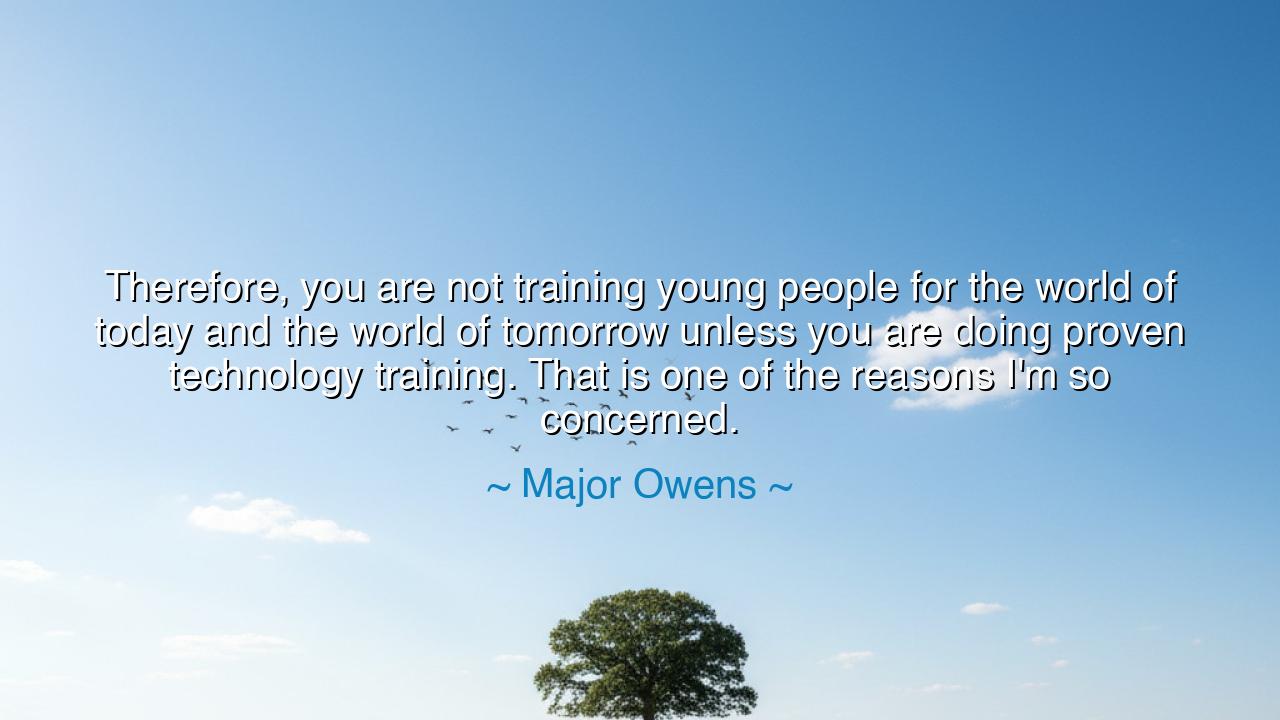
Therefore, you are not training young people for the world of
Therefore, you are not training young people for the world of today and the world of tomorrow unless you are doing proven technology training. That is one of the reasons I'm so concerned.






The words of Major Owens, “Therefore, you are not training young people for the world of today and the world of tomorrow unless you are doing proven technology training. That is one of the reasons I’m so concerned,” resound as both a call to wisdom and a cry of warning. He speaks not merely of schools or students, but of the very destiny of nations, for the strength of tomorrow lies in the preparation of the young. Without knowledge of proven technology, the children are left vulnerable—like warriors sent into battle without armor, like farmers asked to till fields without tools.
Owens, a statesman deeply concerned with education, uttered these words in an era when the rise of computers, digital networks, and automation was transforming the world. He saw with clarity that the gap between those trained in technology and those who were not would widen into a chasm. To him, it was not enough to teach tradition alone; one had to equip the youth with the skills of the present and the tools of the future. In this, his voice joins the chorus of wise teachers across ages who urged the people to ready their children for the changing tides of time.
History itself gives us examples of societies that failed to heed such warnings. In the early days of the Industrial Revolution, many nations clung to old ways while others embraced the new. Those who trained their children to understand machines, ironworks, and engines surged forward into prosperity. Those who ignored such training often fell into hardship, their youth unprepared to thrive in a world reshaped by iron and steam. Thus, the words of Owens echo the lessons of history: the neglect of technological training is not merely an educational failure—it is a failure of survival.
Consider also the story of Japan during the Meiji Restoration. In the 19th century, the Japanese leaders realized that their youth must be trained in the science and technologies of the West if their nation were to stand equal among powers. They sent scholars abroad, imported engineers, and transformed their schools. Within a single generation, Japan had risen from feudal seclusion to modern power. This was not the work of chance, but of foresight—the very foresight Owens pleads for when he warns of his concern.
The heart of his teaching is that true education must prepare not only for the world as it is, but for the world as it will become. To teach children skills that are already fading is to anchor them in the past. To arm them with technology, however, is to give them wings with which to soar into the unknown skies of the future. The blacksmith taught his child the hammer; the scribe, the pen; the farmer, the plow. In our time, the elder must teach the young the keyboard, the code, the circuit, and the network.
And yet, let us not mistake his meaning. Owens did not exalt technology for its own sake. He spoke of proven technology training, the knowledge that had demonstrated its power to shape work, communication, and society. His concern was not in chasing novelty but in failing to ground the next generation in the tools that were already remaking the world. His was not a vision of endless gadgetry, but of equipping the young to stand strong and capable in the midst of inevitable change.
The lesson for us is clear: to secure the future, we must take seriously the duty of teaching technology to our children. Not only in schools, but in homes, communities, and workplaces, we must cultivate a culture where learning never ceases. The practical action is simple: embrace training, seek out new knowledge, and ensure the rising generation is not left behind. For in their hands rests the strength of nations, and in their skills rests the hope of tomorrow.
So let this teaching endure: the world of today and the world of tomorrow will belong to those who are prepared. To neglect the training of the young is to invite decline; to equip them with wisdom and technology is to lay the foundation of prosperity. Hear, then, the concern of Major Owens—not as a warning only, but as a call to action for all who would guide the youth. For if we rise to this charge, our children will not only meet the future—they will shape it.






AAdministratorAdministrator
Welcome, honored guests. Please leave a comment, we will respond soon